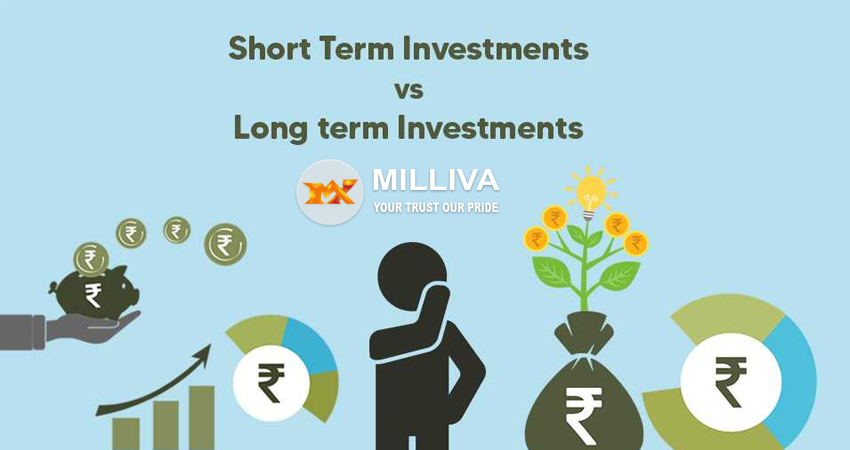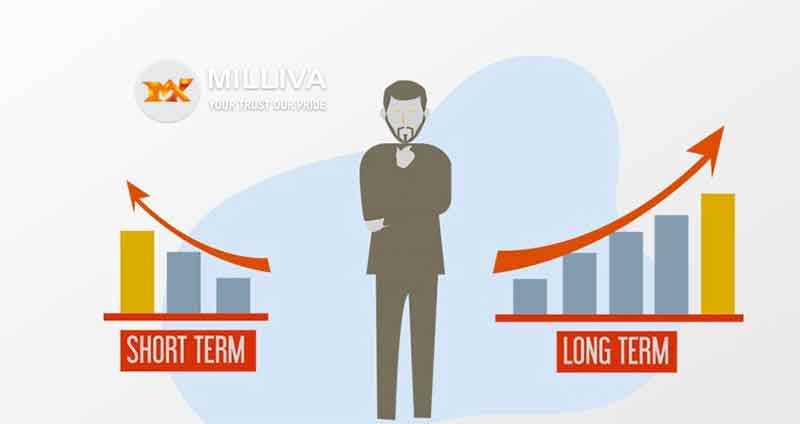Short Term Vs Long-Term Investment?

![]()
Short Term vs Long-Term Investment :There is no other option for rapid money building in financial markets. Investing is a time-consuming activity that demands patience, effort, and constant attention. Your money invested in both the short and long term. Both types of investments have advantages and disadvantages.
Before making any investments, market professionals advise conducting proper research. What is appropriate for another investor may not be appropriate for your financial goals. As a result, you must consider your overall goals as well as the risks you are willing to face.
What is Short Term Investments?
Short-term investments exchanged for a limited time, usually up to three years. These are instruments with strong liquidity and, in general, lower market risks. The following financial products are classified as short-term investments:
Treasury bills are a high liquidity product that redeemed in 91 days.
Gilt Funds
These are funds that solely invest in government securities. These are secure investment funds since they have no credit risk.
Ultra Short Term Debt Funds
These products have maturities ranging from three to six months and offer substantially greater yields.
Low term debt funds have maturities ranging from six to twelve months. These funds put their money into debt and money market products.
Money Market Funds
These funds invest in money market instruments and can be redeemed for up to a year.
Bank fixed deposits have terms ranging from 14 days to ten years. These deposits can be renewed when they reach maturity. Because some banks prohibit early withdrawals, liquidity can be an issue here.
Company fixed deposits: These can be held for a period of more than a year.
Postal time deposits have terms ranging from one to five years.
Recurring deposits: You can start an RD for as little as six months.
Sweep-in-Fixed Deposits: Compared to poor savings account yields, they give considerably greater returns with a minimum term of roughly 12 months.
Mutual funds for large companies: These funds put your money in firms with a high market capitalization and deliver consistent returns after a one to three-year investment period. These funds are low-risk vehicles since they invest in large, well-established corporations.
What is a long Term Investment?
Long-term investments are those that provide larger returns over a period of time, often five years or more. These feature larger market risks and bigger profits, allowing you to invest in riskier market products. These investment alternatives are classified as follows:

Stocks
Stocks are the tangible representation of a portion of a company’s worth. A firm conducts an Initial Public Offering (IPO) to investors in order to generate funding for its operations, following which the company’s shares are traded on stock markets. Stock investing provides the best market returns of up to 16 percent, the most among all investment choices. It is now simple to trade stocks in the digital era.
Before investing in stocks, however, significant market knowledge is essential. You must comprehend market fluctuations in order to determine when to buy and when to sell stocks. Investing in stocks and securities necessitates the use of a reliable financial partner who can give simple features for opening an online Demat Account and a trading account.
Look for perks such as brokerage cashback, free AMC period for Demat Account, and no Demat Account starting costs. Make certain that you obtain the greatest market information in order to maximise profit booking.
Mutual Funds Invested in Stocks
This is another long-term investment opportunity with the potential for bigger profits. To reach your long-term financial goals, you can invest in small and mid-cap equities mutual funds.
Which is Preferable: Short Term or Long Term Investing?
There is no apparent winner here because both have advantages and disadvantages. Short-term investing helps you to attain your financial goals in a short period of time while assuming less risk. Long-term investment routes, on the other hand, might be chosen if you have a larger risk tolerance and desire better returns.
Choose short-term investments if you want to conserve your cash and are content with moderate returns. If you want larger profits, though, you should engage in long-term investment opportunities.
Conclusion
As a result, internet trading has made share trading more comfortable, convenient, rapid, and hassle-free. Remember to create a trading account only with a reputable financial partner that can give a centralized platform for various investing alternatives. Furthermore, make certain that the financial firm provides the greatest stock and plan advice for the maximum earnings.
Visit us : www.milliva.com






Gold Price Prediction Beyond 2022
18th Aug 2022[…] notable declines predicted. Investors should be aware that this expansion will occur gradually. For long-term investors, there is good news: 2024 is predicted to have low volatility. Now let’s get into the […]
What are the Advantages and Benefits of Financial Planning
18th Aug 2022[…] appear out of nowhere. Whether you’ve discovered an investment opportunity or a chance to launch your own firm, these circumstances demand that you come up with money […]
Whipsaw Trade How to Avoid Getting Caught Up in It
28th Aug 2022[…] instance, when an investor buys a stock long, they anticipate that the price will rise over […]
Guide to Build a Personal Financial Plan
09th Sep 2022[…] for 529 education savings. The growth of the investments and withdrawals from these state-sponsored programmes are tax-free if used to pay for eligible educational […]
CFD and Stock - Which is Better for Trading
20th Sep 2022[…] compared to traditional investment options such as stocks or commodities, CFDs provide a lot more freedom. When the market is […]